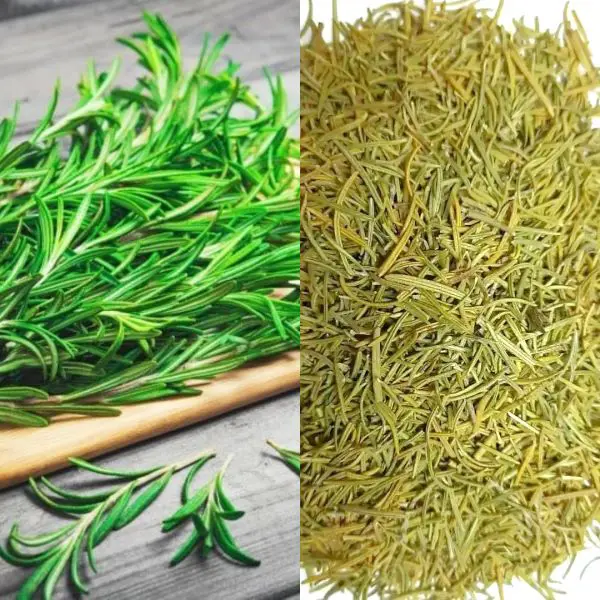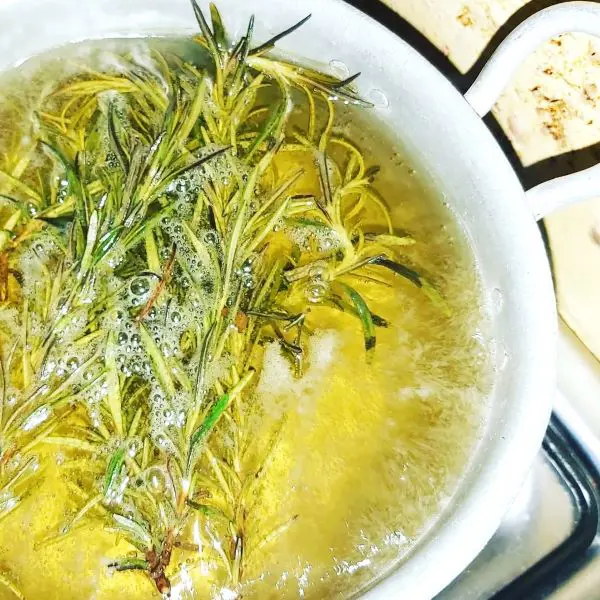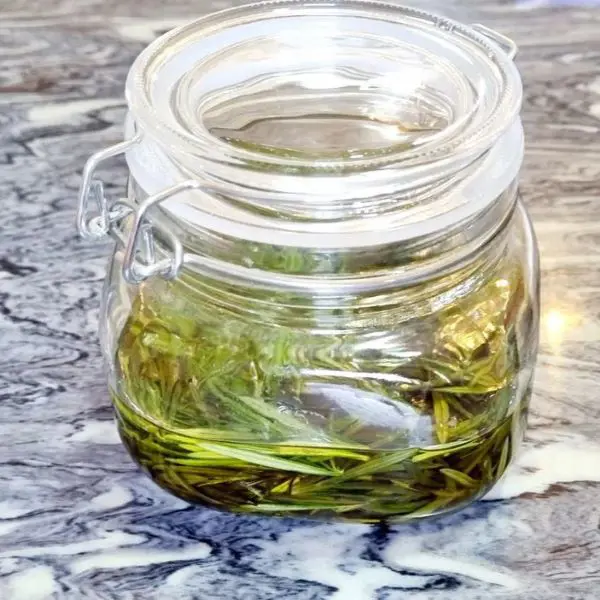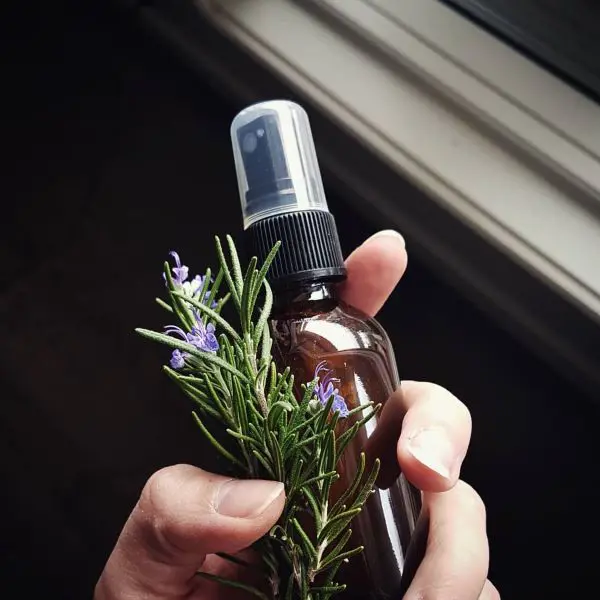Though rosemary has a historical reputation for boosting memory, today it’s more widely recognized for its numerous benefits, with hair care being one of the most notable.
Beyond improving the overall quality of hair, rosemary provides something that many commercial products often lack- natural nourishment and rejuvenation.
Its benefits extend beyond physical appearance, as rosemary has also been known to enhance confidence and transform one’s personality.
This transformative effect is why rosemary has become such a sought-after remedy in today’s wellness routines.
Now, if you're curious about how to prepare rosemary water at home, we’ve put together a simple guide with easy and effective methods. Let’s dive in and start exploring the magic of rosemary water!
Ingredients And Tools You'll Need

Fresh Or Dried Rosemary Leaves
Use a handful of leaves, adjusting the quantity based on your desired concentration. Fresh rosemary leaves offer a stronger aroma, while dried ones work just as well for infusion.
Water
Prepare 2-3 cups of filtered water to avoid impurities, ensuring a cleaner infusion.
Small Pot Or Saucepan
Ideal for boiling and steeping the rosemary. Choose one with a lid to retain the aroma and essential oils during the process.
Fine Strainer
Essential for separating the infused water from the rosemary leaves, leaving you with a smooth liquid.
Clean Storage Container
Opt for a spray bottle for easy application or a jar with a tight lid to store the infused water safely.
Now, it's time to scroll down to know the procedure!
Step 1: Boil The Water

This is a very simple first step that needs good attention. Take a pot or saucepan and pour about 2 or 3 cups filtered water. Heat it to medium until the water boils.
Thus, the activity of boiling water is to ensure the maximum extraction of essential oils with nutrients from the leaves, while filtered water enriches the purities of rosemary water.
Step 2: Add The Rosemary

After reaching a rolling boil, add a handful of fresh or dried rosemary leaves. If you’re using fresh rosemary, you can leave the sprigs intact, while dried rosemary can be used as is.
Gradually, stir the mixture to check the leaves are fully submerged, allowing them to release their essence evenly.
Step 3: Simmer The Mixture

After that, lower the heat to a gentle simmer. Following that, cover the pot partially with a lid and let the rosemary steep for 15-20 minutes.
Simultaneously, you’ll notice the water changing color, often to a light amber or greenish tone. This indicates that infusion is happening while also helping rosemary to become more prominent.
Step 4: Let The Mixture Cool
Once you see the tint, turn off the heat and let the infused mixture cool down to room temperature.
You have to cool it because of two reasons: One is, it ensures the mixture is safe to handle and the other is it helps retain the potency of the infusion.
However, you have to avoid covering the pot completely during this stage to prevent condensation from diluting the mixture.
Step 5: Strain The Liquid

Once the water has cooled down, place a fine strainer over a bowl or directly over your storage container. Slowly pour the rosemary-infused water through the strainer to separate the liquid from the leaves.
If you’re using fresh rosemary sprigs, gently press them with a spoon to extract any remaining essence and maximize the benefits of the infusion.
Step 6: Store The Rosemary Water
In the end, pour the rosemary water into a neat spray bottle or jar with a tight lid.
But if your query leans towards infusion benefits like: how to use rosemary water for hair-a spray bottle will be particularly more useful for easy and even application than a jar.
Therefore, store the rosemary water in the refrigerator to prolong its life. It will then last fresh and potent for around a week when properly stored.
How To Use Rosemary Water For Hair?

With its amazing natural properties, rosemary water can be used in the following ways:
As A Hair Rinse After Shampooing
Without any hassle, you can use rosemary water as a hair rinse. Start by cleaning your head first with a gentle shampoo wash. Then, pour the rinse onto your scalp and hair, without soaking, but just lightly sprinkle or drizzle.
Afterward, gently massage your scalp area and wash it off with cold water. Maybe this eliminates your confusion on how to and when to use rosemary water for hair.
As A Scalp Toner
Does rosemary water grow hair? If this is what you’re thinking then, yes! When used correctly, rosemary water can promote hair growth. To ensure your way is correct, follow these steps: First, fill a spray bottle with rosemary water.
Then section your hair and spray the rosemary water directly onto your scalp. Now, like hair rinse, massage your scalp, next day wash it out with mild shampoo only if you prefer.
As A Leave-In Conditioner
Spray rosemary water onto damp hair before applying your regular leave-in conditioner. This will help hydrate the hair and provide a natural shine. Also, will help you in detangling and smoothing the hair.

As A Natural Hair Perfume
Since rosemary produces a beautiful smell, it can be used as a perfume. Just spray a light mist of rosemary water over your hair after styling for a pleasant fragrance.
As A Pre-Wash Hair Treatment
Rinse the hair with rosemary water for 30 minutes and give a mild massage, then wash it. Therefore, it will complement your normal shampoo and conditioner, giving your hair that much-needed, deeper boost of nutrition.
As A Sun Protector
Rosemary water can offer a layer of protection against sun damage, especially when used in combination with your regular sunscreen routine.
Why Is Rosemary Water Beneficial For Hair?

Promotes Hair Growth
Rosemary water is renowned for enhancing hair growth. It widens hair follicles because of better circulation to the scalp so that it produces denser hair.
So, if you're after growing hair, well, perhaps this could be the miracle ingredient!
Improves Scalp Health
One could be having difficulties with a dry, itchy scalp. Rosemary water possesses properties that are strong enough to make antimicrobial activity, and then, the scalp gets to be healthy and not irritated.
Hence, rosemary helps in the prevention of dandruff to keep the scalp clean and comfortable.
Strengthens Hair
Someone with brittle hair would break easily, and they may try out rosemary water because it's a magical concoction that helps strengthen the hair.
Due to its nourishing aspects, it would definitely help reduce split ends and hair breakage.
Adds Shine And Luster

Need a luster boost? Well, rinses with rosemary water will give your hair that natural healthy glow.
Thus, smoother hair shafts will be produced to break down frizz and leave your hair looking more polished and vibrant.
Prevents Premature Graying
Did you know rosemary can keep premature graying at bay? It may not reverse the course of turning gray, but it's believed to promote the ability of melanocytes in the follicles to continue producing melanin.
As a result, it delays your basic hair color from fading for a longer time.
Balances Oil Secretions Of The Scalp
Whether your condition is an oily scalp or dry, rosemary water brings the best balance of keeping things just right.
For a greasy scalp, it can help in reducing sebum production aside from preventing greasy hair. For a dry scalp, it doles out moisture just right without weighing it down.
Preventing Hair Loss
Rosemary water also helps to counter hair loss. It stimulates hair follicles and strengthens the roots, so that your hair gets what it really needs.
Thus, hair thinning and shedding are avoided and you will eventually have thicker healthier hair.
Do's And Don'ts
Do’s Of Using Rosemary Water

- Do Prepare Rosemary Water Freshly
Whenever possible, prepare fresh rosemary water rather than storing it for longer periods.
- Do Combine Rosemary Water With Other Natural Ingredients
You can improve the beneficial use of rosemary water with different natural ingredients, including aloe vera, lavender, or tea tree oil.
- Do Maintain A Clean Scalp
Preparation of your scalp is essential before you apply rosemary water. Eliminate all the dirt, oily secretion, and accumulation of hair products.
- Do Experiment With Frequency Based On Your Scalp Type
For a greasy scalp, rosemary water should be used regularly, whereas for a dry scalp, it could be used 2-3 times a week to avoid over-drying the scalp.
Don’ts Of Using Rosemary Water

- Don't Let Rosemary Water Sit In Your Hair For Too Long
Although rosemary water is good to have on your hair for a few hours, it should never be left on an entire day. Such use without rinsing makes the scalp feel pretty irritable, especially if it is sensitive skin.
- Don’t Apply Excessively
Applying too much rosemary water can weigh down your hair and lead to unnecessary buildup. Thus, avoid soaking your scalp in it, as a little goes a long way.
- Don’t Rely On Rosemary Water Alone For Severe Hair Issues
Rosemary water does not serve as a magical remedy for baldness or severe dandruff. So consult doctors for major issues.
- Don’t Use Rosemary Water On Wet Hair Without Allowing It To Dry
After applying rosemary water, let your hair dry naturally. Avoid blow-drying your hair immediately, as high heat may cause the beneficial compounds in rosemary water to evaporate or diminish in effect.

To Sum Up
You could try adding any of the following ingredients to rosemary water for the extra boost in your hair care routine:
Add Peppermint Essential Oil: Stimulant to the scalp and boosts strengthening freshness.
Mix With Green Tea: Add antioxidants to even higher protection from damage to hair.
Include Rose Water: Combines rosemary's benefits with added hydration and a pleasant aroma.
Blend With Coconut Water: Enhances moisture levels and helps prevent hair breakage.
Disclaimer: Avoid these ingredients including rosemary water unless you're recommended by the doctor during pregnancy.









